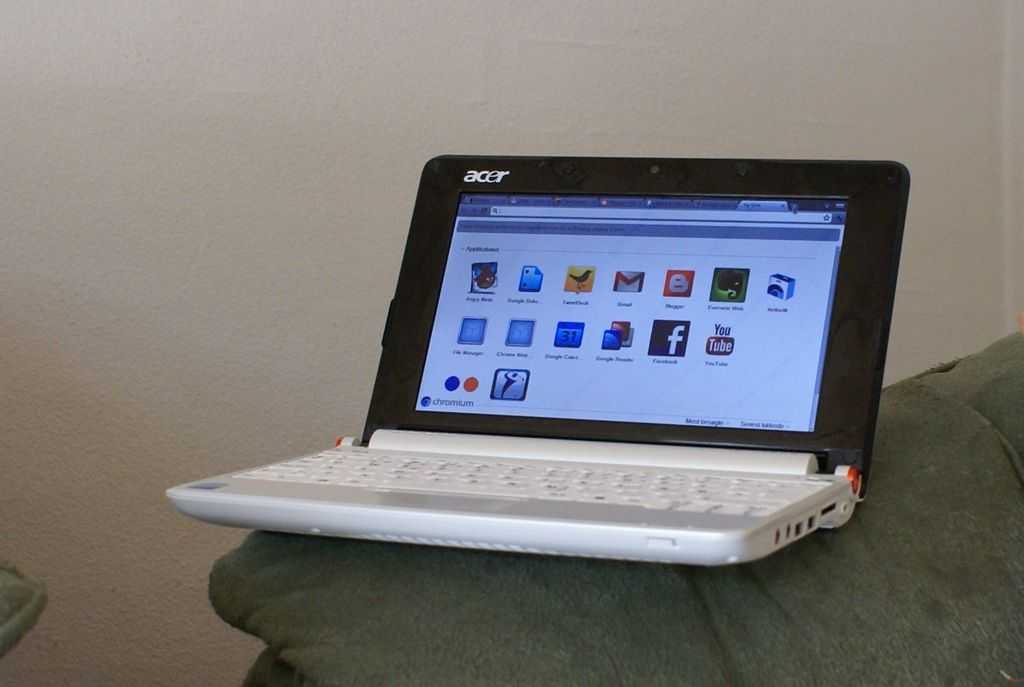
Posted on 19 June 2011
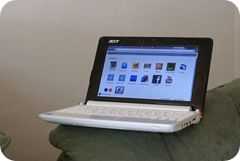 You don’t have to buy a Chromebook to get Chrome OS. Using the Hexxeh open source Chrome OS builds, Lars F. Jørgensen built a Chromebook out of an early netbook, the Aspire One A110. With netbooks in Europe dipping under 200 Euros occasionally now (here’s an offer for a current Acer D255 at Amazon, Germany my Affiliate link) it doesn’t have to be old or expensive either.
You don’t have to buy a Chromebook to get Chrome OS. Using the Hexxeh open source Chrome OS builds, Lars F. Jørgensen built a Chromebook out of an early netbook, the Aspire One A110. With netbooks in Europe dipping under 200 Euros occasionally now (here’s an offer for a current Acer D255 at Amazon, Germany my Affiliate link) it doesn’t have to be old or expensive either.
I’ve posted the article over at Chromebook News as I feel there’s limited ultra-mobile capability in it but it’s interesting to think of Chromium, the browser, on something like Ubuntu or Meego that may not provide the support-free software layer but would provide all the local facilities needed and, as time goes on, some extended power-saving features too.
Many thanks @faarborgs for this guest post.
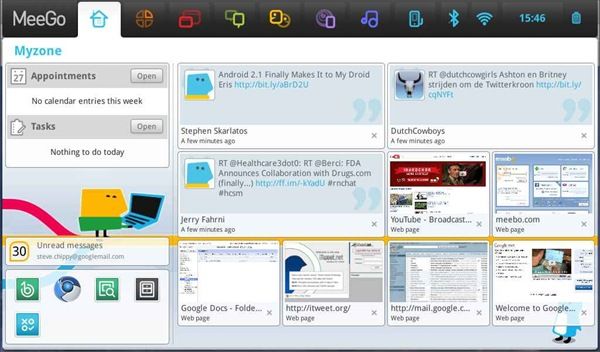
Posted on 27 May 2010
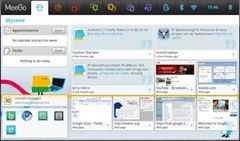 This won’t take long. What we’ve got here is a Moblin build that has picked itself up from being stopped-dead in it’s tracks buy a huge corporate direction change. I imagine that partners that were working with Moblin before MeeGo was announced are pleased that they can finally get back to work in optimising their builds for end products. The core build has been changed and there has been some re-working of the user interface. Chrome has been added as the browser. What is also clear though is that the pace of development appears to have picked up and the MeeGo teams are committing to a six-month cadence meaning that those partners can re-write their roadmaps now and that the products promised last September, can now move forward.
This won’t take long. What we’ve got here is a Moblin build that has picked itself up from being stopped-dead in it’s tracks buy a huge corporate direction change. I imagine that partners that were working with Moblin before MeeGo was announced are pleased that they can finally get back to work in optimising their builds for end products. The core build has been changed and there has been some re-working of the user interface. Chrome has been added as the browser. What is also clear though is that the pace of development appears to have picked up and the MeeGo teams are committing to a six-month cadence meaning that those partners can re-write their roadmaps now and that the products promised last September, can now move forward.
I installed MeeGo 1.0 ‘Netbook User Experience’ on a Medion Akoya netbook (an MSI-Wind clone) last night and it was a smooth experience. First-boot was fast at 27 seconds including my usual 10-second BIOS-lag. First login was simple although there were no options to set up contact syncing or online accounts which are core to the MeeGo experience. The ‘netbook user interface’ is almost exactly the same as on Moblin and is modeled around the ‘home zone’ and other zones that can be activated. People and Internet being the two most important. As before, the UI is fast and bubbly.
It’s a Chrome OS!
Chrome (Chromium, the open source version is being tested here but there’s a true Chrome version available too.) is the major change for the end user and I have to say it’s a good one. It appears to be a recent build because it’s flying through the Sun Spider Javascsript tests. 1.8s is a very respectable time. Full-screen works and Flash is integrated meaning you can expect to operate just as you would on a normal desktop. I used Google Docs to edit a spreadsheet and Flickr to upload some photos without any problems. Facebook works as expected too. If we look to MeeGo on Moorestown, you’ve got the basics of a product that could be the best and one of the most productive smart-books or ‘cloud’ books to date. Add the Intel AppUp store and you’re starting to solve that problem too although Chrome’s Web Application store will be interesting to see working on this.
Basic Applications
There’s an email client (Evolution), a messenger, a reasonable media experience (certainly the Banshee media player seems to be quite feature-rich although I haven’t tested video support yet) and there are a number of other basic apps available through the application manager and ‘Garage,’ a slightly more end-user-friendly application installer although nothing seems to be working in Garage right now.
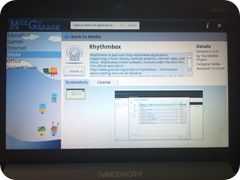
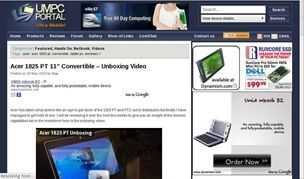
Photo and screen-grab. Image top-right is also from testing.
Other notes
- Sleep works (Using sleep button on keyboard)
- Gmail contacts sync working (uses SyncML)
- Home screen still somewhat limited. 6-tweets on a 1024×600 screen is not exactly efficient use of space!
- Chrome Browser crashes occasionally
- AppUp store install fails
- Media player fails to play imported MP3s
- No GMA500 (Menlow, Poulsbo) support.
- Read/Write to USB sticks and SD cards is no problem.
It’s a shame that MeeGo 1.0 hasn’t moved forward from Moblin 2.1 in terms of end user experience and there’s no way that it will challenge XP or Windows 7 in terms of productivity and flexibility (printing, network shares, application quality, etc.) however when you combine the thought of an efficient Chrome-based Web-focused OS and MeeGo’s future compatibility with the ‘always on’ Moorestown platform combined with a layer of ‘finishing’ you can see some nice possibilities for ‘smart’ productive devices. Certainly the full-internet experience is a major advantage with MeeGo compared to Android. Apps are needed though and until a nicely designed and well-marketed, polished MeeGo product hits the floor, developers aren’t going to be that interested. Maybe that changes after Computex.
We’ll be connecting with Intel’s software group at Computex next week so stay tuned for more information on the future of MeeGo, netbooks, handhelds and Intel’s ‘smart’ platforms. In the meantime, take the time to have a look at MeeGo 1.0 with the netbook user experience in the video below.
MeeGo V1.0 announcement
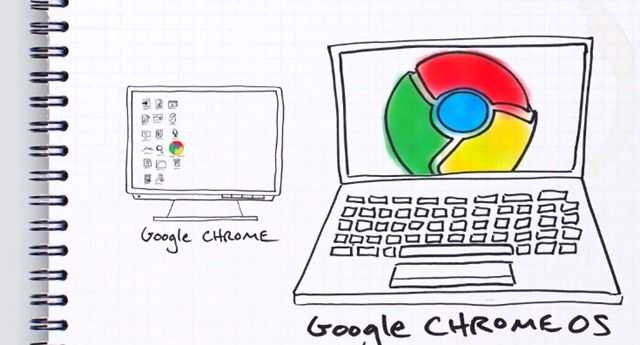
Posted on 19 November 2009
Information is coming through on Google’s Chromium OS from a number of sources. (See below.) I’ve been following the Techcrunch blog and as a mobile-focused end-user, I’m picking up a number of things that turn me off.
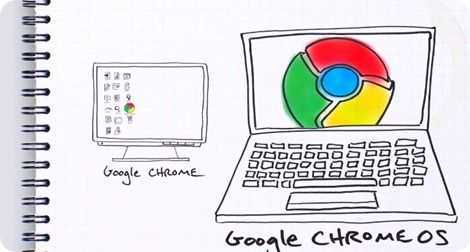
I advise you to check out the two links at the bottom of this article but here are a few pointers.
- Available for end users in a year
- For OEMs to build into devices
- Coming to X86 first then ARM
- Limited device support
- “Android apps currently will not run on Chrome OS. inch
- For devices bigger than netbooks
- [Screeching halt!]
Clearly Chromium OS is for high-speed fixed (stationary) connections and not for mobile devices. Device support will be extremely limited so I wouldn’t expect this to work with 3G, touchscreens, multi-touch mousepads, fingerprint readers, external screens, local storage, extended buttons or other special features we see on UMPCs without it being re-built especially for each device.
Personally I’m having trouble working out what Google are doing here. Is it to promote HTML5 development? Am I failing to see the long-term play? Are we really going to be using operating systems on our desks that are dumber than the ones on our phones?
The advantages for netbooks users are limited. The license cost advantage will be just $15-$25, the device support will be poor and there will be a million and one re-distributions causing confusion and splintering for Linux.
High-speed javascript processing won’t be unique to Chrome. Fast boot won’t be unique to Chrome. HTML5 won’t be unique to Chrome. Web apps won’t be unique to Chrome. What’s going to get people to buy a Chromium OS computer? I doubt people will be queuing up for an OS that never needs upgrading.
Google Blog
Techcrunch
 You don’t have to buy a Chromebook to get Chrome OS. Using the Hexxeh open source Chrome OS builds, Lars F. Jørgensen built a Chromebook out of an early netbook, the Aspire One A110. With netbooks in Europe dipping under 200 Euros occasionally now (here’s an offer for a current Acer D255 at Amazon, Germany my Affiliate link) it doesn’t have to be old or expensive either.
You don’t have to buy a Chromebook to get Chrome OS. Using the Hexxeh open source Chrome OS builds, Lars F. Jørgensen built a Chromebook out of an early netbook, the Aspire One A110. With netbooks in Europe dipping under 200 Euros occasionally now (here’s an offer for a current Acer D255 at Amazon, Germany my Affiliate link) it doesn’t have to be old or expensive either.


















